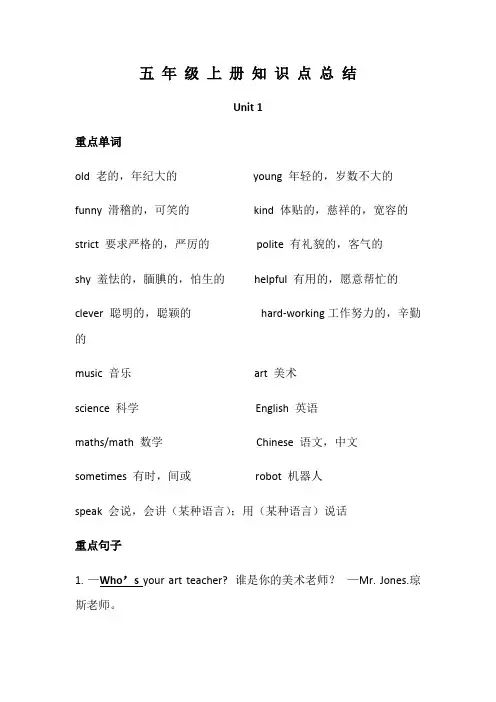人教版五年级上册英语知识点总结
人教版小学英语五年级上册各单元知识点

人教版小学英语五年级上册各单元知识点1. Unit 1- My school dayIn this unit, students will learn vocabulary related to school subjects and daily activities. They will learn how to ask and answer questions about their school day routine.Some key vocabulary includes:- Math- Chinese- English- science- P.E.- art- music- recess- lunch- write- read- study- play- listen2. Unit 2 - This is my familyIn this unit, students will learn family vocabulary and learn how to describe their family members. They will also learn how to use possessive adjectives to talk about their family members.Some key vocabulary includes:- mother- father- sister- brother- grandmother- grandfather- aunt- uncle- cousin- daughter- son- possessive adjectives (my, your, his, her)3. Unit 3 - At the zooIn this unit, students will learn vocabulary related to animals and their habitats. They will also learn how to talk about what animals can do (i.e. run, swim, fly, etc.).Some key vocabulary includes:- lion- tiger- elephant- giraffe- monkey- panda- kangaroo- penguin- habitat (forest, desert, ocean, etc.)- can/can't4. Unit 4 - My homeIn this unit, students will learn vocabulary related to the rooms in a house and furniture. They will also learn how to use prepositions to describe where things are in a room.Some key vocabulary includes:- living room- kitchen- bedroom- bathroom- dining room- sofa- table- chair- bed- closet- prepositions (on, under, next to)5. Unit 5 - My scheduleIn this unit, students will learn how to talk about their daily schedules and activities. They will also learn vocabulary related to time and daily routines.Some key vocabulary includes:- wake up- brush teeth- take a shower- go to school- come home- eat dinner- do homework- bed time- time (hour, minute, second)6. Unit 6 - My hobbiesIn this unit, students will learn how to talk about their hobbies and interests. They will also learn vocabulary related to differenthobbies and sports.Some key vocabulary includes:- play soccer- dance- sing- draw- swim- ride a bike- play the piano- watch TV- read books- hobby- interest7. Unit 7 - Our worldIn this unit, students will learn vocabulary related to different countries and cultures. They will also learn how to ask and answer questions about different places in the world.Some key vocabulary includes:- country- flag- language- symbol- landmark- continent- questions (What's the capital of...? What language do they speak in...?)8. Unit 8 - Let's celebrate!In this unit, students will learn vocabulary related to holidays andcelebrations. They will also learn about different traditions and customs around the world.Some key vocabulary includes:- Halloween- Thanksgiving- Christmas- New Year's Day- Valentine's Day- Easter- tradition- custom- celebrateOverall, these units will help students develop their language skills in various areas such as vocabulary acquisition, grammar usage, and communication. By the end of the fifth grade, students will have a foundation of English language that will prepare them for more complex language use in the future.In addition to the vocabulary and grammar covered in these eight units, there are also important language skills that students will develop, such as reading comprehension and writing ability. Throughout the units, students will be completing various reading activities to help them understand and contextualize the new vocabulary and grammar they are learning. They will also be practicing writing skills, such as paragraph writing and short answer responses.Reading comprehension is a vital skill for English language learners, as it helps students to understand and interpret new information. In each unit, there will be reading passages related to that unit's topic. For example, in Unit 3, students may read aboutdifferent animal habitats and learn how animals adapt to their environment. Reading comprehension activities may include reading comprehension questions, matching exercises, and writing exercises. By the end of each unit, students should have a solid understanding of the reading material and be able to answer questions related to the content.Writing is another essential skill that students will develop throughout these units. Writing exercises will be incorporated into each unit, helping students to practice writing in English and apply the new vocabulary and grammar they are learning. Some writing exercises may include writing short paragraphs about their hobbies or describing their family members. By the end of the fifth grade, students should be able to write coherent paragraphs with proper grammar, spelling, and punctuation.Speaking and listening skills will also be developed through group and partner activities in each unit. Students will be encouraged to ask and answer questions in English, and engage in conversations with their peers. They will also have opportunities to give short presentations on topics related to each unit, which will help them develop their public speaking skills.Overall, these eight units are designed to provide a comprehensive language learning experience for students in fifth grade. By the end of the program, students should be able to understand and use everyday English vocabulary and grammar in a variety of contexts. They should also be able to read and comprehend short passages, write short paragraphs independently, and engage in conversations and presentations with their peers. It is important to note thatlanguage learning is a gradual process, and students will vary in their language proficiency at the end of the program. However, with consistent practice and dedication, students in fifth grade will be well-prepared for more advanced language learning in the future.。
人教版五年级上册英语知识点归纳

人教版五年级上册英语知识点归纳人教版五年级上册英语知识点人教版五年级上册英语知识点Unit 1一. 单词:young年轻的funny滑稽可笑的tall高的strong强壮的kind和蔼的,亲切的old年老的short矮的thin瘦的who’s = who is Mr先生like像、喜欢what’s = what is he’s = he is principal校长university student大学生strict 严格的smart聪明的、巧妙的active积极的、活跃的very 很、非常but但是quiet安静的;文静的she’s = she is二. 句子:1.A:Who’s your English teacher ? 你的英语老师是谁?B:Mr Carter. 卡特先生.2. He’s from Canada. 他来自加拿大。
3. A:What’s he like ? 他什么样?B: He’s tall and strong . 他又高又壮。
He’s very funny. 他很滑稽。
(Who,What引导的特殊疑问句,用来对不熟悉的老师进行问答:Whos + 某人?Whats he / she like? He / She is + 与身体特征和性格特征有关的形容词。
)4.A: Who’s that young lady/? 那个年轻的女士是谁?B:She’s our principal. 她是我们的校长。
5.I have a new math teacher. 我有一位新数学老师。
6.Her class is so much fun. 她的课非常有趣。
7.She’s a university student. 她是一名大学生。
8. A: Is she quiet ? 她很安静吗?B: No, she isn’t. She’s very active. 不是的。
她很活跃的。
( Is引导的一般疑问句,谈论某位老师是否具有某方面的特征:Is he / she + 与身体特征和性格特征有关的形容词,回答用:Yes, he / she is. No, he / she isnt. )9. A:Is she strict ? 她很严格么?B:Yes, she is , but she’s very kind . 是的,但她很和蔼的。
五年级英语上册知识点总结

人教版英语五年级上册知识点汇总Unit One What ’s he like?知识点归纳 一、词汇四会单词:old 老的,年纪大的 young 年轻的,岁数不大的funny 滑稽的,可笑的 kind 体贴的,慈祥的,宽容的 polite 有礼貌的,客气的hard -working 工作努力的,辛勤的 性格特点 helpful 有用的,愿意帮忙的 clever 聪明的,聪颖的 shy 羞怯的,腼腆的,怕生的三会单词:now 知道,了解 our 我们的will 将要 sometimes 有时,间接 robot 机器人 him 他 finish 完成,做好speak 会说,会讲(某种语言),用(某种语言)说话 MS 女士(用于女子的姓氏或者姓名前,不指名婚否)其他:Who ’s =Who is 谁是 What ’s = What is 是什么 Mrs 太太 Miss 小姐 Mr 先生 二、句型1、询问人art 美术English 英语music 音乐——Who’s your maths 数学teacher?谁是你们的science 科学老师?PE 体育Chinese 语文——Mr Jones. 琼斯先生/ Miss Green. 格林小姐2、询问人的外貌特征/性格特点——What’s he/she like? 他/她这个人怎么样?——He/She is kind/ strict/old/tall…….3、——Is he/she young? 他/她年轻吗?——Yes,he /she is. 是的,他/她年轻。
No,he/she isn’t. 不,他/她不年轻。
4、以Do you 开头的句子的回答——Do you know Mr Young?——Yes,I do. 是的,我知道。
(肯定回答)No,I don’t. 不,我不知道。
(否定回答)5、Ms Wang will be our new Chinese teacher.王老师将成为我们的新语文老师。
人教版五年级上册英语知识点总结

人教版五年级上册英语知识点总结Grade 5 Unit 1 SummaryXXXold。
young。
funny。
kind。
strict。
polite。
shy。
helpful。
clever。
hard-working。
music。
art。
science。
English。
maths。
Chinese。
sometimes。
robot。
speak.Key XXX1.Who's your art teacher。
- Mr。
Jones.2.Is he young。
- Yes。
he is。
/ No。
he isn't.3.What's Wu Yifan like。
- He's hard-working.4.Ms Wang will be our new Chinese XXX.5.He is very helpful at home.6.Robin is short but strong.7.He can speak Chinese and English.8.XXX.XXXXXX "y" at the end of a word is pronounced as [i] in words with two or more syllables。
such as baby。
happy。
windy。
sunny。
sorry。
candy。
many。
family。
and party。
In single-syllable words。
"y" at the end is pronounced as [ai]。
such as by。
my。
why。
cry。
and fly.Key Knowledge and Grammar1.Asking XXX: "What's he/she like?" - "He/She is kind/。
(完整版)人教版五年级上册英语知识点总结

五年级上册知识点总结Unit 1重点单词old 老的,年纪大的young 年轻的,岁数不大的funny 滑稽的,可笑的kind 体贴的,慈祥的,宽容的strict 要求严格的,严厉的polite 有礼貌的,客气的shy 羞怯的,腼腆的,怕生的helpful 有用的,愿意帮忙的clever 聪明的,聪颖的hard-working工作努力的,辛勤的music 音乐art 美术science 科学English 英语maths/math 数学Chinese 语文,中文sometimes 有时,间或robot 机器人speak 会说,会讲(某种语言);用(某种语言)说话重点句子1. —Who’s your art teacher? 谁是你的美术老师?—Mr. Jones.琼斯老师。
2. —Is he young? 他年轻吗?—Yes, he is. 是的,他年轻。
—No, he isn’t. 不,他不年轻。
3. —What’s Wu Yifan like? 吴一帆怎样?—He’s hard-working. 他很勤奋。
4. Ms Wang will be our new Chinese teacher. 王老师会成为我们的新语文老师。
5. He is very helpful at home. 他在家很能干。
6. Robin is short but strong. 罗宾个子矮,但是身体强壮。
7. He can speak Chinese and English. 他会说中文和英语。
8. He makes me finish my homework. 他让我写作业。
语音字母y在单词中的发音:1、双音节或多音节词末发[ i ]。
bab y happ y wind y sunn y sorr y cand y man y famil y part y 婴儿开心的有风的晴朗的对不起糖果许多家庭聚会课外补充:2、y 在单音节词末发[ ai ]例:b y乘坐m y我的wh y为什么cr y哭fl y 飞重点知识及语法1 、询问他人的外貌或性格:-What’s he/she like? - He/She is kind/…2 、一般疑问句的问与答::—Is he/she…?—Yes, he/she is. —No, he/she isn’t.—Do you know…? —Yes, I do. —No, I don’t3 、be动词的三种形式am, is, are与人称代词连用的用法:I + am,He, she, it ,人名、物名+ isWe, you, they + are4 、Ms., Miss, Mr., Mrs.的区别:Ms. [miz](缩略词)(用于女子的姓氏或姓名前,不指明婚否)女士;Miss [mis](用于未婚女子的姓氏或姓名前,以示礼貌)小姐,女士;Mr. [mist ](mister 的缩略词)(用于男子的姓氏或姓名前)先生;Mrs. [misiz](用于已婚女子的姓氏或姓名前)太太;夫人。
人教版五年级上册英语知识点总结

人教版五年级上册英语知识点总结人教版五年级上册英语知识1Unit 11、询问他人的外貌或性格:-What's he/she like? - He/She is kind/…2、一般疑问句的问与答:—Is he/she…?—Yes, he/she is. —No, he/she isn't.—Do you know…? —Yes, I do. —No, I don't3、be动词的三种形式am, is, are与人称代词连用的用法:I + am,He, she, it,人名、物名+ isWe, you, they + are4、Ms., Miss, Mr., Mrs.的区别:Ms. [miz](缩略词)(用于女子的姓氏或姓名前,不指明婚否)女士;Miss [mis](用于未婚女子的姓氏或姓名前,以示礼貌)小姐,女士;Mr. [mistE](mister的缩略词)(用于男子的姓氏或姓名前)先生;Mrs. [misiz](用于已婚女子的姓氏或姓名前)太太;夫人。
5、and和but的区别:and “和,与”,表并列关系 He is tall and thin. 他又高又瘦。
but “但是”,表转折关系 He is short but strong. 他个子矮,但是身体强壮。
人教版五年级上册英语知识2Unit 21、询问做什么事/活动:—What do you do …? —I often play ping-pong…询问星期几上什么课:—What do you have on…? —We have English class…2、一般疑问句的问与答:—Do you often read books? —Yes, I do. —No,I don't.3、 on+具体某一天(年月日,星期),如:on Monday/Tuesday…课外 at+具体时刻(…点钟),如:at 12 o'clock 在十二点整补充: in+大致时间(年月,早中晚),如:in 2014 在2014年 in the morning/afternoon/evening4、play + 球类、棋类、娱乐活动,如:play football/ping-pong补充:play + the + 乐器(第四单元知识),如:play thepipa/piano/violin…人教版五年级上册英语知识3Unit 31、询问想要吃/喝什么:—What would you like to eat/drink? —I'd like…2、询问最喜欢的事物:—What's your favourite food/vegetable/…? —My favourite food/…is…/I like…3、名词复数的规则变化:(1)直接加s;(2)以s, x, sh, ch结尾的,加es,如, buses boxes sandwiches(3)以o结尾,有生命的加es,如,potatoes tomatoes无生命的加s,如,photos pianos zoos补充:(4)以辅音加y结尾,改y为i再加es,如,families babies以元音加y结尾,直接加s,如,boys days(5)以f或fe结尾,改f为v再加es,如knife-knives 小刀 leaf-leaves 树叶4、some+可数/不可数名词例:some apples(可数) somewater/rice/juice/bread/…(不可数)课外补充:不可数名词(词后不可以加-s/es,所接动词用单数is /V-s/es)液体 water milk tea orange(桔汁) coke juice气体 air(空气)食物 food rice bread fruit肉类 meat(肉) fish beef chicken物质work(工作) paper(纸) time music weather(天气) snow money人教版五年级上册英语知识4Unit 41、询问对方会做什么事情:—What can you do? —I can play the pipa.2、can句型的否定句:I can't play the pipa.3、can句型的一般疑问句的问与答:—Can you do any kung fu? —Yes, I can./No, I can't.4、play + the + 乐器,例play the erhu /pipa /piano…play + 球类、棋类、娱乐活动,例 play basketball/football/ping-pong…5、some与any的异同:相同之处:都有“一些”的含义;不同之处:some+可数名词复数/不可数名词(用于肯定句中)例:I can do some kung fu. 我会打功夫。
五年级上册英语知识点总结
五年级上册英语知识点总结一、词汇与短语1. 学校相关词汇- classroom 教室- library 图书馆- teacher 老师- student 学生- homework 家庭作业- lesson 课- break 课间休息- subject 学科2. 家庭与日常生活- family 家庭- parent 父母- sibling 兄弟姐妹- meal 餐- breakfast 早餐- lunch 午餐- dinner 晚餐- routine 日常3. 动物与自然- animal 动物- bird 鸟- fish 鱼- mammal 哺乳动物- reptile 爬行动物 - insect 昆虫- forest 森林- river 河流4. 食物与饮料- fruit 水果- vegetable 蔬菜- meat 肉类- snack 小吃- dessert 甜点- beverage 饮料- water 水- milk 牛奶5. 交通与旅行- car 汽车- bus 公共汽车- train 火车- plane 飞机- travel 旅行- destination 目的地 - map 地图- hotel 酒店6. 职业与工作- job 工作- doctor 医生- nurse 护士- teacher 老师- engineer 工程师- farmer 农民- worker 工人二、语法1. 一般现在时- 描述习惯性动作或状态- 例句:I usually get up at 6:30.2. 一般过去时- 描述过去发生的动作或状态- 例句:We visited the museum last Saturday.3. 一般将来时- 描述将来的动作或计划- 例句:They will go on a trip next month.4. 现在进行时- 描述正在进行的动作- 例句:She is reading a book right now.5. 可数名词与不可数名词- 可数名词:可以用数字计数的名词,如 apples, books- 不可数名词:不能用数字计数的名词,如水 water, information6. 代词- 主格代词:I, you, he, she, it, we, they- 宾格代词:me, you, him, her, it, us, them- 形容词性物主代词:my, your, his, her, its, our, their - 名词性物主代词:mine, yours, his, hers, its, ours,theirs7. 形容词与副词- 形容词:描述事物的特征或性质,如 big, small, happy- 副词:描述动作的方式、地点、时间等,如 quickly, happily, here8. 情态动词- can, could, may, might, must, should, will, would三、句型结构1. 简单句- 基本句型:主语 + 谓语 + 宾语- 例句:The cat sleeps on the mat.2. 并列句- 使用并列连词连接两个或多个简单句- 例句:I like apples, but I don't like oranges.3. 复合句- 包含主句和从句的句子- 例句:When it rains, I usually take an umbrella.4. 问句- 使用疑问词提问- 例句:What time is it? / Where are you going?四、阅读理解与写作技巧1. 阅读理解- 学习通过上下文推断生词的意思- 练习总结文章的主旨大意- 练习寻找文章中的细节信息2. 写作技巧- 学习如何写日记、信件和简短的故事- 练习使用恰当的时态描述不同的事件- 练习组织段落,使用主题句和支持句五、听力与口语1. 听力- 练习听懂日常对话和简短的叙述- 学习如何从听力材料中提取关键信息2. 口语- 练习日常交流,如自我介绍、购物、问路 - 学习如何使用正确的语音和语调- 练习参与小组讨论和角色扮演六、文化知识1. 了解英语国家的节日和习俗2. 学习英语国家的历史和。
最新完整人教版五年级英语上册第五单元知识点归纳总结及作文范文
Unit 5 There is a big bed一、词汇与短语1、重点单词1. clock /klɒk/ 时钟;钟2.plant /plɑːnt 植物3.bottle /ˈbɒtl/ 瓶子4.bike /baɪk/ 自行车;脚踏车5.photo /ˈfəʊtəʊ/ 照片;相片6.front /frʌnt/ 正面7.between /bɪˈtwiːn/ 在……中间8.above /əˈbʌv/在(或向)……上面9.beside /bɪˈsaɪd/ 在旁边(附近)10.behind /bɪˈhaɪnd/ 在(或向)…后面11.there /ðeə(r)/(表示存在或发生)12.their /ðeə(r)/ 他们/她们/它们的13.house/haʊs , haʊz/ 房屋;房子;住宅14.lot/lɒt/ 大虽;许多15.flower /ˈflaʊə(r)/ 花;花朵16.move /muːv/ 搬家17.dirty /ˈdɜːtɪ/ 肮脏的18.mouse /maʊs/ 老鼠19.everywhere /ˈevriweə(r)/ 处处;到处20.grandparent /ˈɡrænpeərənt/ 祖父;祖母;外祖父;外祖母2、重点短语1. water bottle 水瓶2. in front of 在……前面3.a lot of = lots of 大量;许多4.so many pictures 许多照片5.many pretty flowers 很多漂亮的花6.in the room 房间里面7.beside the bed 在床旁边8.a nice photo 一张漂亮的照片9.on the desk 在桌子上10.in the picture 在图片中11.on the plate 在盘子上12.in my room 在我房间里13.in front of the house 在房子前面14.lots of flowers 许多花15.move into…搬进…16.on the floor 在地板上17.everywhere 到处,处处18.behind my computer 在我电脑后面19.near the nature park在自然公园附近20.above the desk 在桌子下面21.beside the river 在河边22.go home 回家23.poor can 可怜的罐头24.be late for school 上学迟到了25.between two fish 两条鱼之间26.Over Rabbit 在兔子头顶上3、重点句子1. There is a big bed. (这里)有张大床。
人教版小学英语五年级上册重点总结
人教版小学英语五年级上册重点总结Unit 1 How do you do?
在这个单元,学生将学习英语的基本问候语和自我介绍。
以下是本单元的一些重点:
•精通基本的问候语和自我介绍;
•学习一些频率副词和简单的现在时态;
•学习简单的数字和计数。
Unit 2 What’s this in English?
学生将学习一些基本的英语单词,如色彩、食物和动物等。
以下是本单元的一些重点:
•学习基本的食物,如苹果、橙子、米饭、面包和牛奶等;
•学习颜色,如红色、黄色、绿色和蓝色等;
•学习一些基本的动物,如鱼、猫、狗、青蛙和鸟等。
Unit 3 How much are these socks?
在这个单元,学生将学习购物和货币。
以下是本单元的一些重点:
•学习一些基本的购物词汇,如衣服、鞋子、袜子和披肩等;
•学习一些货币和数字,如一元、两元、十元、美元和欧元,以及购物对话;
•学习商店的语言和表达方式,如。
人教版五年级上册英语知识点归纳总结
人教版五年级上册英语知识点归纳总结一、句子基本结构:主语+谓语+宾语二、不可数名词没有复数形式,与much/some/any搭配(1)肉类:mutton,chicken,fish,pork,meat,beef(2)液体:water,milk,tea,coffce,juice,coke,soup(3)特殊:cabbage,eggplant,tofu,bread,salad,rice(全部都是不可数的)三、like的三种意思本学期总共学习了3种关于like的三种意思,让我们来看看:1、be动词加like就是问样子,如:What‘s your father like?你的爸爸是什么样子的?2、与would连用为“想要”的意思,如:What would you like for lunch?你午餐想吃什么?3、与do,don't,does,doesn't连用或单独使用,为“喜欢”的意思。
如:What do you like?你喜欢什么?四、区别many,anysome用于肯定句和表示邀请、请求的句式:Can I have some...?(请求)any用于否定句和一般疑问句中,如:Do you have any sister?(一般疑问句) 五、代词我你他她它我们你们他们主格I you he she itwe you they宾格me you him her itus you them物主代词my我的your你的his他的her她的its它的our我们的your你们的their他们的六、冠词a/an/thea:用于辅音音标前:a university student.an:用于元音音标前:an active boy.七、重点,阴湿题:鱼fish的复数和不可数鱼单复数也行(在水里快活)单复数同形单数a fish 不可数:鱼肉(已煮熟,已死了)八、缩写1、I'm=I am我是2、you're=you are你们是3、he's=he is他是4、she's=she is她是5、it's=it is它是6、we'r=we re我们是7、they're=they are它们是。
- 1、下载文档前请自行甄别文档内容的完整性,平台不提供额外的编辑、内容补充、找答案等附加服务。
- 2、"仅部分预览"的文档,不可在线预览部分如存在完整性等问题,可反馈申请退款(可完整预览的文档不适用该条件!)。
- 3、如文档侵犯您的权益,请联系客服反馈,我们会尽快为您处理(人工客服工作时间:9:00-18:30)。
五年级上册知识点总结Unit 1重点单词old 老的,年纪大的 young 年轻的,岁数不大的funny 滑稽的,可笑的 kind 体贴的,慈祥的,宽容的strict 要求严格的,严厉的 polite 有礼貌的,客气的shy 羞怯的,腼腆的,怕生的 helpful 有用的,愿意帮忙的clever 聪明的,聪颖的 hard-working工作努力的,辛勤的music 音乐 art 美术science 科学 English 英语maths/math 数学 Chinese 语文,中文sometimes 有时,间或 robot 机器人speak 会说,会讲(某种语言);用(某种语言)说话重点句子1、—Who’s your art teacher 谁就是您的美术老师—Mr、 Jones、琼斯老师。
2、—Is he young 她年轻不—Yes, he is、就是的,她年轻。
—No, he isn’t、不,她不年轻。
3、—What’s Wu Yifan like吴一帆怎样—He’s hard-working、她很勤奋。
4、 Ms Wang will be our new Chinese teacher、王老师会成为我们的新语文老师。
5、 He is very helpful at home、她在家很能干。
6、 Robin is short but strong、罗宾个子矮,但就是身体强壮。
7、 He can speak Chinese and English、她会说中文与英语。
8、 He makes me finish my homework、她让我写作业。
语音字母y在单词中的发音:1、双音节或多音节词末发[ i ]。
bab y happ y wind y sunn y sorr y cand y man y famil y part y婴儿开心的有风的晴朗的对不起糖果许多家庭聚会课外补充 :2、y 在单音节词末发[ ai ]例:b y乘坐 m y我的 wh y为什么 cr y哭 fl y 飞重点知识及语法1 、询问她人的外貌或性格:-What’s he/she like - He/She is kind/…2 、一般疑问句的问与答: :—Is he/she…—Yes, he/she is、—No, he/she isn’t、—Do you know…—Yes, I do、—No, I don’t3 、be动词的三种形式am, is, are与人称代词连用的用法:I + am,He, she, it ,人名、物名+ isWe, you, they + are4 、Ms、, Miss, Mr、, Mrs、的区别:Ms、 [miz](缩略词)(用于女子的姓氏或姓名前, 不指明婚否)女士; Miss [mis](用于未婚女子的姓氏或姓名前,以示礼貌)小姐,女士; Mr、 [mist ](mister 的缩略词)(用于男子的姓氏或姓名前)先生; Mrs、 [misiz](用于已婚女子的姓氏或姓名前)太太;夫人。
5 、and 与与 but 的区别:and “与,与” , 表并列关系 He is tall and thin、她又高又瘦。
but “但就是” , 表转折关系 He is short but strong、她个子矮,但就是身体强壮。
重点作文1 、介绍自己、朋友或老师等熟悉的人物,如:My …teacher/friend/…。
思路导引(1)开头:交代人物的身份 I have a/an…He/She is…(2)中间:1)体貌He/ She is tall/strong…He/She has …hair/eyes…2)性格 He/She is strict/kind…3)爱好 He/She likes playing pingi-pong/…或 He/She often read books/… on the weekend、(3)结尾:评价人物或抒发对人物的情感 I like him/her very much、2:范文:(1)课本 P9 Read and write识记口诀 :我用 am, 您用 are, is 用于她、她、它,所有复数都用are。
(2) My Chinese teacherI have a new Chinese teacher、 She is Ms、 Chen、 She is tall and thin、 She has big eyes and long blackhair、 She is kindand funny、 Sometimes she is strict, too、 She is hard-working、She likes reading、 Her class isso much fun、 We all like her、Unit 2重点单词Sunday (Sun、) 周日 Monday (Mon、) 周一Tuesday (Tue、/Tues、) 周二 Wednesday (Wed、/Weds、) 周三Thursday (Thur、/Thurs、) 周四 Friday (Fri、) 周五Saturday (Sat、) 周六 weekend 周末(周六、日) wash my clothes 洗衣服 watch TV 瞧电视do homework 做作业 read books 瞧书play football 踢足球 on the weekend 在周末play sports/do sports 做体育运动 listen to music 听音乐play ping-pong 打乒乓球重点句子1、—What do you have on Thursdays 星期四您们上什么课—I have math, English and music、我们上数学、英语与音乐课。
2、—What do you do on Thursdays, Grandpa 爷爷,星期四您要做什么—I have a cooking class with your grandma、我与您奶奶去上烹饪课。
3、—Do you often read books in this park 您经常在这个公园瞧书不—Yes, I do、就是的—No, I don’t、不就是4、 Look at my picture、瞧我的图片。
5、 You look tired、您瞧起来很累。
6、 You should play sports every day、您应该每天做运动。
语音字母组合 ee, ea 在单词中的的发音:[ i: ]例:feet beef meet see feed tea read eat repeat脚牛肉遇见瞧见喂养茶阅读吃重复注 :1、ee 组合绝大部分发长音[ i: ],只有少部分发短音[ i ],如:coffee 咖啡2、ea 字母组合除了发[ i: ],还有可能发[ e ]等发音,如:bread 面包,或者发[ ei ],如:great 好极了重点知识及语法1 、询问做什么事/ 活动:—What do you do …—I often play ping-pong…询问星期几上什么课:—What do you have on…—We have English class…2 、一般疑问句的问与答:—Do you often read books —Yes, I do、—No, I don’t、3 、 on+) 具体某一天(年月日,星期),如:on Monday/Tuesday…课外 at+ 具体时刻(…) 点钟),如:at 12 o’clock 在十二点整补充 : in+) 大致时间(年月,早中晚),如:in 2014 在 2014 年 in the morning/afternoon/evening4 、play + 球类、棋类、娱乐活动,如:play football/ping-pong 补充:play + the + 乐器(第四单元知识),如:play the pipa/piano/violin…重点作文1 、描写一周的生活,如:My week思路导引(1)开头:简单的自我介绍:My name’s…/ I’m…(2)中间:1) 介绍周一至周五的情况,可以着重介绍自己最喜欢的那一天:I go to school from Monday to Friday、 I like…because I have…2)介绍自己周六、日的活动:I often watch TV/…on the weekend、(3)结尾:This is my week、 What about yours2 、范文:My weekMy name is Li Ming、 I go to school from Monday to Friday、 I like Tuesdays and Thursdays, because Ihave music and PE、 I often do my homework and read books on Saturdays、 I often play ping-pong onSundays、Unit 3重点单词ice cream 冰淇淋 hamburger 汉堡包tea 茶 sandwich 三文治salad 沙拉 fresh 新鲜的,刚摘的healthy 健康的 delicious 美味的;可口的hot 辣的;辛辣的 sweet 含糖的;甜的hungry 饿的 thirsty 渴的;口渴的favourite 特别喜爱的 food 食物drink 喝;饮 carrot 胡萝卜chicken 鸡肉 onion 洋葱milk 牛奶 bread 面包beef noodles 牛肉面 fish sandwich 鱼肉三明治tomato soup 西红柿汤重点句子1、—What would you like to eat 您想吃什么—A sandwich, please、请给我一个三明治。
—What would you like to drink 您想喝什么—I’d like some water、我想喝点水。
2、—What’s your favourite food 您最喜欢吃什么食物—Noodles、 They are delicious、面条。
面条很好吃。
3、 My/His /Her favourite food is fish、我/她/她最喜欢的食物就是鱼。
4、 I’m hungry/thirsty、我饿/渴了。
5、 I don’t like beef but chicken is OK、我不喜欢牛肉但就是鸡肉也可以。
